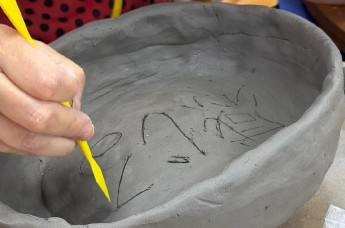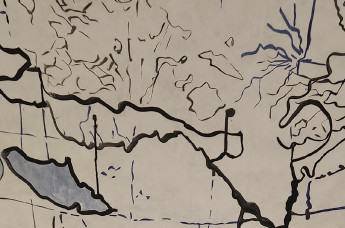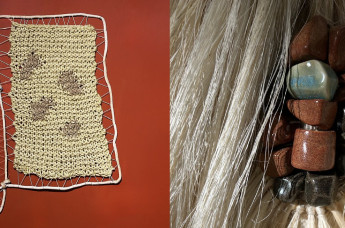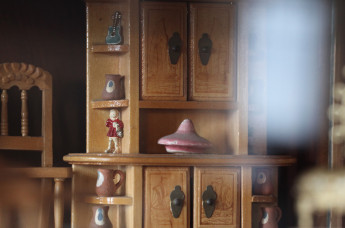In its tenth anniversary year, and under the patronage of UNESCO, from the end of June BIENALSUR will unite more than 30 countries in a unique, diverse and transnational cartography.
A decade after its foundation, BIENALSUR 2025 will be held between June and December. Organised by the Universidad Nacional de Tres de Febrero (UNTREF), Argentina's public university, and the Fundación Foro del Sur, since 2015 it has managed to consolidate a unique transnational model in the international art circuit, with a specific network of venues, linking artists, places and audiences all over the world.
The itinerary of the 2025 edition includes cities such as Bogotá, Montevideo, San Pablo, Santiago de Chile, Lima, Madrid, Paris, Berlin, Rome, Dakar, Tokyo, Istanbul, Beirut, among others. The transnational cartography goes from Km 0, the MUNTREF Centro de Arte Contemporáneo, in the Hotel de Inmigrantes in Buenos Aires, a symbol of the meeting of cultures, to kilometre 19640 in Shanghai, China.
This year the journey begins on 26 June in Bogotá, Colombia. In July, exhibitions will be inaugurated in Argentina, Spain, Chile and Bolivia to continue its journey through other countries on all continents.
In its 5th edition, BIENALSUR will have 140 venues in more than 70 cities in 34 countries, proposing a critical and sensitive dialogue that allows to continue building a contemporary, dynamic and universal humanism with the most urgent issues of our time: artificial intelligence, environmental issues, human rights, migrations, memory and possible futures.
Among the venues that will host BIENALSUR are the Museo de Arte Moderno de Bogotá (MAMBO), the Museos de la Universidad de Tres de Febrero (MUNTREF), the Museo Reina Sofía and the Museo Centro de Arte Dos de Mayo in Madrid, Centre Pompidou in Paris and Málaga, Museo de Roma, Fondazione Pistoletto Cittadellarte, Fundação Oriente in East Timor, the Instituto Cervantes in Shanghai and in Dakar, Senegal.
In this celebration of 10 years, BIENALSUR has the patronage of the Italian artist, nominated for the Nobel Peace Prize, Michelangelo Pistoletto, and the participation of Marta Minujín (ARG), Erwin Wurm (AUT), Cristina Lucas (ESP), Carlos Amorales (MEX), Pierre Ardouvin (FRA), Colectivo El Puente (COL), Inci Eviner (TUR), Elva Bairon (ARG), Hicham Benhoud (MAR), Janueario Jano (AGO), Paz Errazuriz (CHL), Sebastián Díaz Morales (ARG), Clemente Padín (URU), Adriana Lestido (ARG), Alberto Tadiello (ITA), Tansy Xiao (CHN), Sarah Brahim (SAU), Aurelia Mihai (ROU/DEU), Ivanna Vollaro (ARG), Tina Willgren (SWE), Francys Alyss (MEX/BEL), Nuria Güel (ESP), Hana Yoo (KOR), Shuai Liu (CHN), Belén Rodríguez (PRY), Diego Masera (ARG-MEX), Igshaan Adams (ZAF), Tony Amaral (TLS), Etson Caminha (TLS), Juventino Madeira (TLS), Voluspa Jarpa (CHL), Francisca Jiménez Otegate (COL), Claudia Andújar (BRA), Pamela Diamante (ITA), Ettore Favini (ITA), Paulo Nazareth (BRA), Juan Sorrentino (ARG), Alaa Tarabzouni (SAU), Jorge Martín Vásquez (COL), Sergio Vega (ARG), Siru Wen (CHN), Jasmina Cibic (SVN), Alla Rumyantseva (TJK), Yasmeen Sabri (JOR), Donna Conlon (PAN), María Adela Díaz (GTM), Laura Fong Prosper (PAN), Alexia Miranda (SLY), Max De Esteban (ESP), Colectivo Las Tesis (CHL), Colectivo Mujeres Por La Vida (CHI), Colectivo Sub-Cooperativa de Fotógrafos (ARG), Dagoberto Rodríguez (CUB), Cildo Meireles (BRA), Astrid González (COL), among other artists.
The curatorial team of BIENALSUR 2025 is composed of Fabien Danesi (FRA), Eugenio Viola (ITA), Tania Pardo (ESP), Lauriane Grincourt (FRA), Juan Canela (PAN), Clive Kellner (ZAF), Fundación Oriente (TLS), Nisha Merit (DEU), Soufianne Er-Rahoui (MAR), Greta de León (MEX), Lía Colombino (PRY), Lucía Rey (CHL), Henry Serrano (CHL), Marisabel Villagómez (BOL), Anja Bauer-Kersken (DEU), Francis Naranjo (ESP), Heike van den Valentyn (DEU), Pedro Donoso (CHL), María Alejandra Gatti (ARG/NVG), Chimène Costa (ARG/MOZ), Toia Ibáñez (ARG), Cristina Blanco (ARG), Alicia Valente (ARG), Stefanie Kreuzer (DEU), Cristina Sommer (ARG), Gonzalo Aguilar (ARG), Marcos Krämer (ARG), Joaquín Barrera (ARG), Bruno Juliano (ARG), Analía Solomonoff (ARG), Ana Volonté (ARG), Maricel Álvarez (ARG), Hernán Pacurucu (ECU) and Soledad Aguirre (ECU). Also joining the curatorial team of BIENALSUR are Diana Wechsler (ARG), Benedetta Casini (ITA), Clarisa Appendino (ARG), Fernando Farina (ARG) Florencia Battiti (ARG), Florencia Incarbone (ARG).
As a promoter of a network of associative collaboration between museums, cultural centres and universities around the world, BIENALSUR carries out joint projects that bring together artists and institutions in challenging exchanges. In this framework, artist residencies will be held at Cittadellarte (Biella, Italy), FRAC (Corsica, France), Fundación Marso (CDMX, Mexico), Tokyo University of the Arts (Japan), Centro Cultural Alfonso Lagos (Chillán, Chile), Connecting Communities (Mozambique), Instituto Cervantes (Dakar, Senegal), Bitamine Faktoria (Irún) and MUNTREF (City of Buenos Aires, Argentina).
CURATORIAL AXES
In its unique dynamic, BIENALSUR received, through an OpenCall, more than 5,000 proposals from artists and curators. The result of this active listening was the definition of five main curatorial axes:
A fairer world: addresses social, economic, gender, racial and territorial inequalities. It invites us to imagine other pacts of coexistence and distributive justice through the visual arts.
Dissidence and dissonance: it expands the field of the visible and the audible by incorporating dissident voices, subaltern knowledge, silenced memories and expressions that question the dominant norms. Queer poetics, indigenous cosmovisions and non-hegemonic cultures have a place here.
Becoming territory: explores the relationships between body, territory and community. It is linked to practices that reflect on the environmental crisis, conflicts over land, networks of affection and local resistance.
Modes of inhabiting: reflects on contemporary ways of living, migrating, living together, resisting and building a home. The works brought together in this axis address issues such as housing, borders, displacement and networks of affection.
Memory and rewritings: proposes a critical revision of official historical accounts, based on archives, testimonies and fictions that recover other versions of the past. Art thus becomes a device for rewriting and symbolic reparation.
‘The voice of the creators, in a global context marked by inequalities, hate speeches, the environmental crisis and forced displacements, affirms BIENALSUR's commitment to propose a political and poetic act through art, imagining other forms of justice, belonging and community’, says Aníbal Jozami, general director of the biennial.
Diana Wechsler, artistic director of BIENALSUR, specifies that "the search for a fairer world condenses the spirit of the proposals received. The perspectives of possible futures are also present, exhibiting the tension between the dystopian and the utopian".
True to its expansive imprint, BIENALSUR 2025 will be in museums, cultural centres, universities, embassies, rural areas and heritage sites. This multiplicity of presence responds to a logic of territorialisation that favours local links and characterises the work in community that has been characteristic of the biennial since its beginnings.
BIENALSUR 10 YEARS
Created within the framework of a public university in Argentina, the Universidad Nacional de Tres de Febrero (UNTREF), under the general direction of Aníbal Jozami and the artistic direction of Diana Wechsler, BIENALSUR was born with the intention of redefining the usual parameters of circulation and legitimisation of contemporary art. In these ten years, it has woven a global network of collaboration with museums, universities, art collectives, public and private organisations, adopting a logic of co-production and shared curatorship. Unlike classic formats, its route is not limited to a single place or moment, but unfolds simultaneously in different cities, from large capitals to peripheral localities.
"We set out to decentralise cultural production and build a platform that connects artists, curators and institutions beyond the traditional centres. Since its first edition, BIENALSUR has proposed an alternative way of conceiving major artistic events. Far from the spectacle and the market, its commitment lies in the sustained work with artists and communities, the free circulation of works, institutional co-production and an ethic of collaboration," Jozami explains.
"What distinguishes BIENALSUR is not only its scale, but its underlying cultural policy. We want art to dialogue with the territories, to question the conditions of life and to propose other ways of inhabiting the world. We want contemporary art to be at the service of a critical sensibility towards the present, and to help build more inclusive, more equitable, more diverse futures", Wechsler remarks.
BIENALSUR: A HUMANIST, GLOBAL AND TRANSNATIONAL INITIATIVE
BIENALSUR upholds access to culture as a fundamental ethical principle, promoted by a community committed to art as a tool for inclusion and transformation.
BIENALSUR, as a transnational platform, provides artists from all over the world with rare spaces of expression and freedom.
BIENALSUR has a strong academic network that allows for a rigorous analysis of the contemporary art world.




